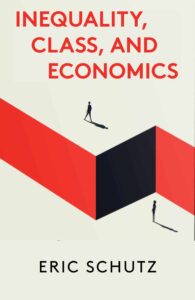Inequality, Class, and Economics
REVIEWS, 24 Jan 2022
Eric Schutz | Montly Review - TRANSCEND Media Service
 The COVID-19 pandemic exposed the economic inequalities pervading every aspect of society—and then multiplied them to a staggering degree. A mere nine months into the lockdown, the net worth of the infamous Forbes 400 increased by one trillion dollars. In a single year the US poverty rate rose by the largest amount ever since record-keeping began sixty years ago. At the same time, mass unemployment imperiled or erased the fragile right to quality health care for a substantial number of people living in states without Medicaid. In Inequality, Class, and Economics, Eric Schutz illumines the pillars undergirding the monstrous polarities which define our times— and reveals them as the very same structures of power at the foundations of the class system under today’s capitalism.
The COVID-19 pandemic exposed the economic inequalities pervading every aspect of society—and then multiplied them to a staggering degree. A mere nine months into the lockdown, the net worth of the infamous Forbes 400 increased by one trillion dollars. In a single year the US poverty rate rose by the largest amount ever since record-keeping began sixty years ago. At the same time, mass unemployment imperiled or erased the fragile right to quality health care for a substantial number of people living in states without Medicaid. In Inequality, Class, and Economics, Eric Schutz illumines the pillars undergirding the monstrous polarities which define our times— and reveals them as the very same structures of power at the foundations of the class system under today’s capitalism.
Schutz defines the five social structures of power at the foundations of the class system and capitalism today. Employers’ power is the linchpin of that system, but the power of professionals in all fields, the power exerted by some businesses over others, political power, and the power of cultural institutions, especially the mass media and education, are also critical for the class system today. Each of these social power structures is examined closely and shown both to sustain and to be sustained by economic inequality.
Employing both traditional and novel approaches to public policy, Inequality, Class, and Economics offers prescriptions that can genuinely address the steepening and hardening of class boundaries. This book pushes past economists’ studied avoidance of the problem of class as a system of inequality based in unequal opportunity, and exhorts us to tackle the heart of the problem at long last.
“In Inequality, Class and Economics, Eric Shutz cares for his readers by explaining his arguments clearly and cogently, writing chapters with beautifully crafted economic theory and empirics—all out of a desire for enhancing the common good, reestablishing bonds of community and trust, and ultimate concern for the health of the eco-social system. Eric Shutz acts as a Public Intellectual, much like Paul M. Sweezy, Paul Baran and C Wright Mills before him, in explaining the world’s greater concentrations of power and inequality that reduce the quality of life and standard of living of the vast majority of citizens as well as quality of the biosocial environment.”
______________________________________________
is a Professor Emeritus at Rollins College, where he taught a great variety of Economics courses from 1987-2015. He is the author of Markets and Power: The Twentieth Century Command Economy and Inequality and Power: The Economics of Class, as well as articles in the Review of Radical Political Economics, the Forum for Social Economics, the Journal of Economic Issues, and the Encyclopedia of Political Economy.
Tags: Capitalism, Corruption, Elites, Finance, Fiscal Paradises, Greed, Inequality, Post-capitalism, Profits, Pyramid schemes, Reviews, Super rich
DISCLAIMER: The statements, views and opinions expressed in pieces republished here are solely those of the authors and do not necessarily represent those of TMS. In accordance with title 17 U.S.C. section 107, this material is distributed without profit to those who have expressed a prior interest in receiving the included information for research and educational purposes. TMS has no affiliation whatsoever with the originator of this article nor is TMS endorsed or sponsored by the originator. “GO TO ORIGINAL” links are provided as a convenience to our readers and allow for verification of authenticity. However, as originating pages are often updated by their originating host sites, the versions posted may not match the versions our readers view when clicking the “GO TO ORIGINAL” links. This site contains copyrighted material the use of which has not always been specifically authorized by the copyright owner. We are making such material available in our efforts to advance understanding of environmental, political, human rights, economic, democracy, scientific, and social justice issues, etc. We believe this constitutes a ‘fair use’ of any such copyrighted material as provided for in section 107 of the US Copyright Law. In accordance with Title 17 U.S.C. Section 107, the material on this site is distributed without profit to those who have expressed a prior interest in receiving the included information for research and educational purposes. For more information go to: http://www.law.cornell.edu/uscode/17/107.shtml. If you wish to use copyrighted material from this site for purposes of your own that go beyond ‘fair use’, you must obtain permission from the copyright owner.